
Gideon Mailer came to the University of Minnesota system from the University of Cambridge, UK. He is outgoing Chair of the History Program at UMD (2016-2021). From 2008-2012 he was an elected Title A Fellow of St John’s College, University of Cambridge, where he lectured and supervised in American and Atlantic history and in the history of intellectual thought. Before his Junior Research Fellowship at St. John’s, Cambridge, he took his PhD under Betty Wood (2008), MA, and BA (hons) (Double-First Class) from Cambridge.
His research follows two parallel tracks, both of which highlight how painful historical events such as the American Revolutionary wars, the consolidation of transatlantic slavery, or the murder of Jews and Indigenous people have impacted the way moral, religious, and philosophical ideas are subsequently understood and represented.
The first track considers the social, intellectual, constitutional, and religious history of North America and the wider Atlantic World from 1600-1865. More specifically, it focuses on the impact of the Scottish Enlightenment and Calvinist evangelicalism on the American Revolution and the development of American federalism, as well as their contribution to the tension between liberty and racial slavery through the American Founding.
The second track considers the biological and philosophical implications of the history and memory of Indigenous population loss following the arrival of Europeans in North America. It focuses on the contribution of Early American Studies and Indigenous history to Comparative Genocide Studies and Holocaust Studies, and vice versa.
Selected Recent Publications
(1) John Witherspoon’s American Revolution (Chapel Hill: University of North Carolina Press, Omohundro Institute of Early American History and Culture, 2017).
Second edition (Paperback) published in February 2019
http://uncpress.unc.edu/browse/book_detail?title_id=3797
On the relationship between piety, enlightenment thought, and political unionism from the colonial era through to the American Revolution. Witherspoon was the only clergyman to sign the American Declaration of Independence.
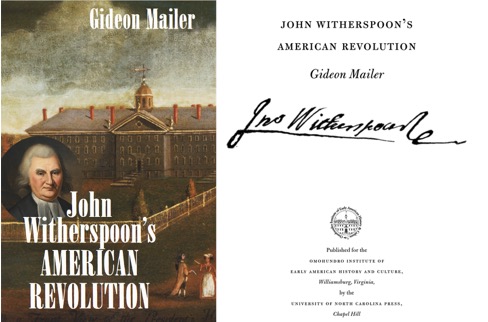
Selected Reviews:
“…this is intellectual and cultural history of a high order…a reminder that the eighteenth century in general, and the Revolutionary era in particular, saw a balancing act between twin impulses of the time, one philosophical, another religious—and both political.” --Reviews in American History
“…a compelling case…a lens through which to more accurately gauge the interplay of religious conflict and Enlightenment philosophy in the founding of the United States.” --American Historical Review
“A landmark in Scottish-American historiography.” --Eighteenth-Century Scotland
“Mailer’s tour de force of research has produced a cornucopia of insights into a key but underappreciated leader of the eighteenth-century Atlantic world...” --Mark A. Noll, University of Notre Dame
“Mailer explores the rich philosophical origins of the Revolutionary War, American education, and the United States’s distinctive civil religion….This work transforms our understanding of the only minister to sign the Declaration of Independence and his most influential student, James Madison.” --Kate Carté Engel, Southern Methodist University
“…Mailer uncovers a specifically Scots Presbyterian dimension to the political and moral culture of Revolutionary America.” --Ned Landsman, State University of New York, Stony Brook
“...Mailer provides new clarity on the relation of religion and politics at the founding..." --Journal of Church and State
“…In this thoroughly researched and sophisticated book, Mailer cuts against the grain of recent scholarship...” -- First Things: American's Most Influential Journal on Religion and Public Life
“This is early American intellectual history at its best..” --New Jersey Studies
“It is no mean feat to provide a significant contribution to the scholarly conversation on the American Revolution.” -- Journal of Presbyterian History
“Mailer writes eloquently and clearly concerning these complex interactions between evangelical devotion and Scottish enlightenment philosophy, and in doing so, illuminates the character, philosophy, and piety of his subject...Throughout, Mailer's scholarship, prose, and organization are exemplary.” -- Journal of Scottish Philosophy
“This thoroughly researched work is best suited for scholars of Enlightenment history and the American Revolution.” --Library Journal
“Thoroughly researched. . . . [A] detailed investigation. Recommended.” --Choice
“…Highly Recommended...” --Douglas Sweeney, Sweeney’s Booknotes, Jonathan Edwards Center
(2) Remembering Histories of Trauma: North American Genocide and the Holocaust in Public Memory (New York and London: Bloomsbury Academic Press, April 2022).
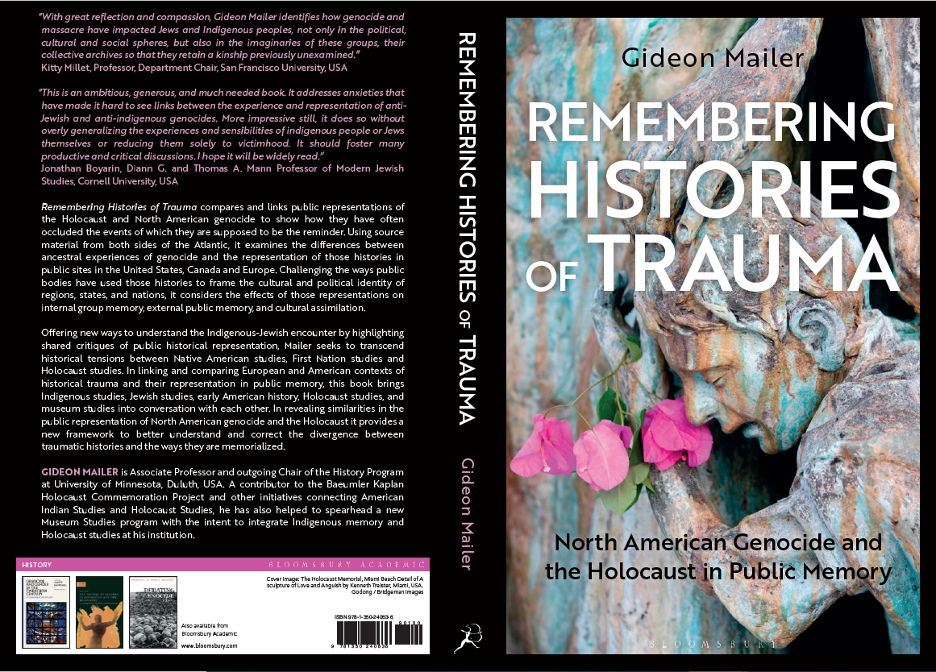
Remembering Histories of Trauma compares and links public representations of the Holocaust and North American genocide to show how they have often obscured the events of which they are supposed to be the reminder. Using source material from both sides of the Atlantic, it examines the differences between ancestral experiences of genocide and the representation of those histories in public sites in the United States, Canada, and Europe. Challenging the ways public bodies have used those histories to frame the cultural and political identity of regions, states, and nations, it considers the effects of those representations on internal group memory, external public memory, and cultural assimilation.
Selected Reviews
“This is an ambitious, generous, and much needed book. It addresses anxieties that have made it hard to see links between the experience and representation of anti-Jewish and anti-indigenous genocides. More impressive still, it does so without overly generalizing the experiences and sensibilities of indigenous people or Jews themselves or reducing them solely to victimhood. It should foster many productive and critical discussions. I hope it will be widely read.”
-- Jonathan Boyarin, Diann G. and Thomas A. Mann Professor, Cornell University, USA
“With great reflection and compassion, Gideon Mailer identifies how genocide and massacre have impacted Jews and Indigenous peoples, not only in the political, cultural and social spheres, but also in the imaginaries of these groups, their collective archives so that they retain a kinship previously unexamined.”
-- Kitty Millet, Professor and Department Chair, San Francisco University, USA
(3) “Presbyterian Confederal Ideology from the Imperial British Constitution to the new United States,” in Peter C. Messer and William T. Harrison, eds, Revolution as Reformation: Protestant Faith in the Age of Revolutions (Tuscaloosa: University of Alabama Press, 2021).
On the history of multilayered forms of representation in Scottish Calvinist theological systems and their influence on theories of confederation and federation in colonial America and during the American Founding.
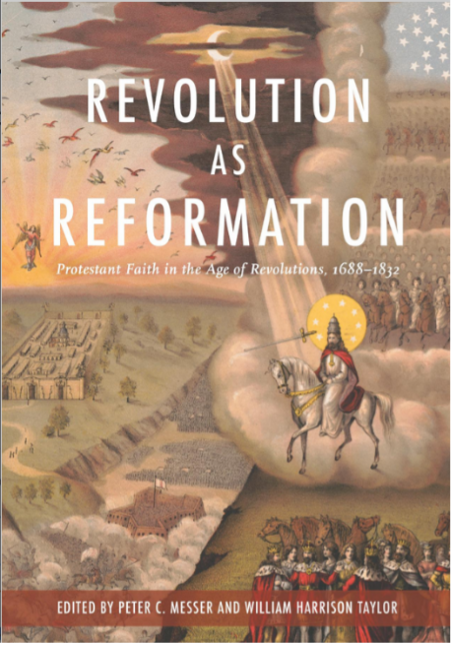
(4) “Freedom from spiritual slavery, but from civil too”: Jonathan Edwards, the Scottish Enlightenment, and American Slavery,” in Daniel N. Gullotta and John T. Lowe, eds. Jonathan Edwards within the Enlightenment: Controversy, Experience, & Thought (The Jonathan Edwards Center at Yale University: 2020)
On the tension between enlightenment and evangelicalism in the moral philosophy of America’s most famous theologian, and the impact of that tension on Edwards’s ambiguous approach to the continuation of racial slavery in the American colonies.
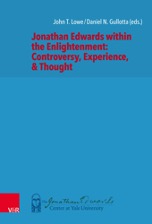
(5) Decolonizing the Diet: Nutrition, Immunity, and the Warning from Early America (London and New York, 2018) (with N.E. Hale)
http://www.anthempress.com/decolonizing-the-diet-hb
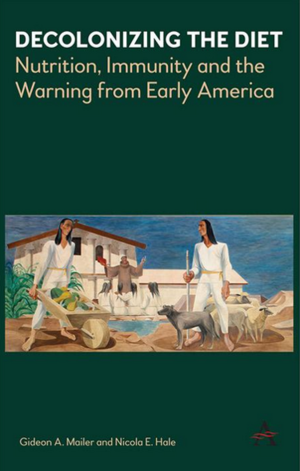
Comparing the European transition from Paleolithic hunting and gathering with Native American subsistence strategies before and after 1492, the book offers a new way of understanding the link between biology, ecology, and history. After examining the history and bioarchaeology of ancient Europe, the ancient Near East, ancient Native America, and Europe during the medieval Black Death, it sets out to understand the subsequent collision between indigenous peoples and Europeans in North America from 1492 to the present day. Synthesizing the science of nutrition, immunity, and evolutionary genetics with a new history of indigenous North America, Decolonizing the Diet highlights a fundamental model of demographic destruction: Human populations have been able to recover from mass epidemics within a century, whatever their genetic heritage. They fail to recover from epidemics when their ability to hunt, gather, and farm nutritionally dense plants and animals is diminished by war, colonization, and cultural destruction. The history of Native America before and after 1492 clearly shows that biological immunity is contingent on historical context; not least in relation to the protection or destruction of long-evolved nutritional building blocks that underlie human immunity.
Selected Reviews:
“Mailer and Hale provide a powerful critique of Virgin Soil theory and its claim that epidemics were the inevitable consequence of European colonization. Drawing on cutting-edge nutrition science, immunology, and archeology, they conclusively demonstrate how the chaos of encounter disrupted American Indian agriculture, triggered widespread malnutrition and left Indians susceptible to dire mortality." --David S. Jones, A. Bernard Ackerman Professor of the Culture of Medicine, Faculty of Arts and Sciences and the Faculty of Medicine, Harvard University
"Mailer and Hale challenge us to consider how colonization’s multiple consequences—dietary changes, diseases, and settler invasions—resulted in long-term problems for Indigenous Peoples. Based on cutting-edge research on nutrition, immunity and ethnohistory, Decolonizing the Diet offers a fascinating analysis that both illuminates the past and informs the present." --Paul Kelton, Professor of History and Robert David Lion Gardiner Chair, Department of History, State University of New York, Stony Brook
“A historian and a scientist, respectively, Mailer and Hale manage to weave together a cohesive narrative of how the forces of nutrition, immunity, environmental change, disease, settler colonialism, and many other tangential factors have influenced the general health of Native American people, from the Paleolithic and Neolithic eras to the present.” --Chelsey Luger, Turtle Mountain Chippewa / Standing Rock Sioux
The book was the subject of an extended commentary and essay in the Winter 2021 edition of Nature and Culture, to explore “the authors’ shared theme of situating food in place—ecology as the intersection of geography, history, culture, and biology”:
“Decolonizing the Diet is written for those who get excited by complex biological processes and their cultural and political implications, drawing from archeological and historical case studies from Indigenous populations within the borders of the contemporary United States.”
“…[the authors] provide examples of the way ideas about biological inferiority were actively constructed and racialized through histories of intentionally violent acts that undercut functional systems of survival. At stake is not only the loss of Indigenous communities, Indigenous knowledge, and Indigenous foods, but also the demise of the wisdom of being in communion with the ecosystems within which we, as a species, were born.”
“As peers, we are limited in our ability to fully know one another, humility being another core value, delimited as we are by the acts of watching, listening, and learning. This sense of humility is visible in Mailer and Hale’s analyses of Indigenous food systems in North America and the recognition that scientific understandings about macronutrient and micronutrient interaction is still incomplete. Yet, as they show within Native American food complexes, this knowledge was built into the ecosystem. Each component that became food or helped shape food was defined by its interactions with the surrounding community. The trees, the insects, the mycelium, large mammals, small rodents, mosses—everything was in constant conversation aimed at balance.”
-- Keitlyn Alcantara, “Not Lost but Found: Rebuilding Relations and Reclaiming Indigenous Food Systems,” Nature and Culture Volume 16, Issue 3 (Winter 2021): 110–118
(6) Join or Die: Unity and Conflict in North America, 1492-1865 (New York, Cognella Academic Press, 2019)
A new textbook anthology to provide college students with stimulating readings in Early American History.
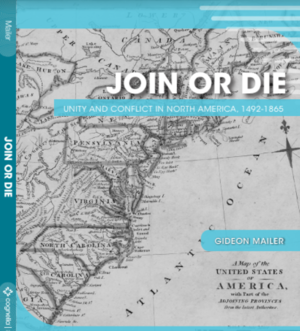
(7) The Character of Freedom: Slavery and the Splintering of American Moral Philosophy from the Colonial to the Antebellum Era .
(Completed manuscript, under review). It is the first book to examine how the enslavement of African people in North America, the Caribbean, and mainland Britain influenced the formulation and reception of Scottish Enlightenment and Scottish evangelical ideas among black and white thinkers on both sides of the Atlantic. It traces the overlooked impact of those ideas on the tension between liberty and enslavement in the history of the American Revolution and the American Founding.
Courses Offered
HIST 3310 - Colonial America: The American Revolution
This course studies the social and political values, ideas, and experiences of colonial and revolutionary America that underlay the eventual formation of the United States. Particular attention is given to the different ways in which American settlers and indigenous peoples from varying social and ideological contexts reconceived their own past history/histories.
HIST 3315 - Religion in Colonial America
Examines the history of religion, in all its forms, during the period of Colonial America and the American Revolution. Special attention is given to the role of religion in the social and political changes of the colonies.
HIST 3318 - Slavery, Lincoln and the Civil War
Examines the history of the Civil War and its causes, the history of slavery and the lives of enslaved Africans in America, the lives of African Americans, the constitutional argument over the nature of American liberty, the expansion of the union during the nineteenth century, and the career of Abraham Lincoln.
HIST 2350 - Nutrition and American History (Fulfils Lib Ed Requirements for Sustainability and Humanities)
This course is unique in its joint appeal to students of history and student of biology, as well students from other related fields in the humanities and the sciences. Students will be exposed to cutting-edge research linking the study of early American history, American Indian history, the history of American ecology, modern nutritional science, and the development of immunity to disease. Students will be required to understand the ways in which published scientific data and research can inform historical case studies of the encounter between colonial Americans, American Indians, and European from the fifteenth century to the twentieth century – and vice versa. Students will be introduced to contemporary debates on the relationship between nutritional science and human immunity, using the to understand the history of colonial American and American Indian health, farming, hunting, and ecology following European contact. These histories, in turn, will illuminate their reading of scientific papers and research.
HIST 1304 - US History Part I: 1607-1877
Evolution of the United States from colonial origins into a modern nation. Frontier and agrarian heritage, constitutional development, emergence of modern U.S. political system, expansion of democracy, and cultural diversity. Colonial period to 1877.